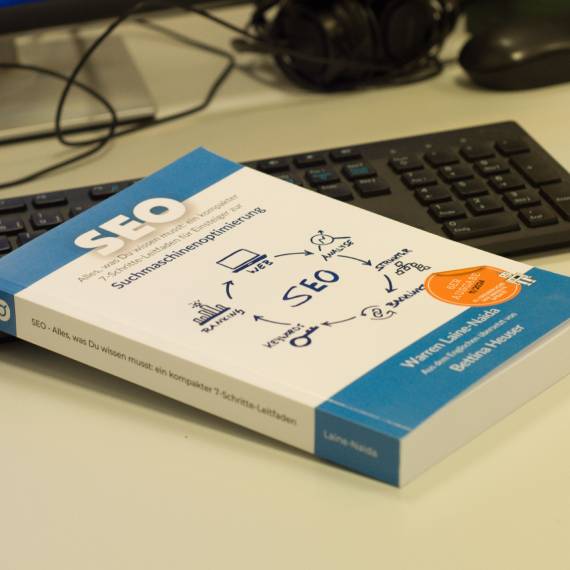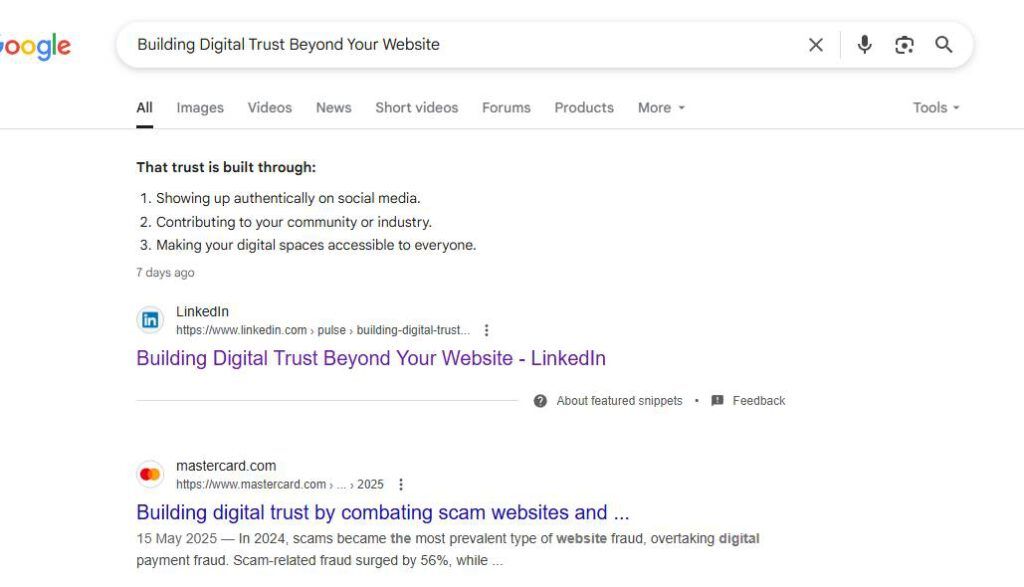Last Updated on October 22, 2025
On-page SEO assumes people still visit websites. But in a world where nearly 60% of searches end without a click, AI overviews answer queries directly, and people increasingly rely on social media, YouTube, and platforms like ChatGPT for information, visibility no longer depends on your site’s structure or metadata. It depends on being cited, mentioned, and shared off-site.
Your content doesn’t need to rank – it needs to travel.
“A majority of Google searches – 58.5% in the U.S. and 59.7% in the EU – result in zero clicks. A zero-click search happens when users end their session or enter a new query without clicking on any results.” searchengineland.com

Off-Page SEO. Bridget Willard, Rob Cairns (YouTube below), and I are currently exploring this topic together.
Over on Twitter/X, we’ve been hearing a lot: Some people say there is no such thing as Off-Page SEO, while others place far too much emphasis on On-Page SEO. Then there are the Tech Bros and their Tech SEO mantra.
Honestly, we need to cut to the chase. It doesn’t matter what you call it – no one discovers you via your website.
My SEO Focus: It’s All Off-Page Now
Everything I do in SEO right now is off-page. Not because I’m neglecting on-page, but because it’s no longer where visibility begins. In fact, on-page SEO mostly assumes that people will still land on websites. That assumption is increasingly outdated.
If you’re still measuring SEO success primarily by organic traffic and keyword rankings, you’re using a 2015 playbook in a 2025 world. You need a new game plan.
Zero-Click Reality
More than 65% of search queries end without a single click. Google answers people directly—with featured snippets, “People Also Ask” boxes, and AI-generated overviews.
The traditional idea of ranking a webpage to earn traffic is losing relevance. Visibility and authority now live off-site, not just on a page.
Zero-Click Searches Are the New Normal
A significant portion of searches now end without a click. According to a SparkToro study from 2024, nearly 60% of Google searches result in zero clicks, as users find answers directly on the search results page. websitebuilderexpert.com
AI Search Has Changed Everything
People aren’t just searching on Google anymore—they’re asking ChatGPT, Perplexity, and Gemini. These tools summarize answers from multiple sources. They don’t send traffic to your site.
So what matters? Getting cited, mentioned, or embedded in the data streams these tools draw from. That’s where I put my energy.
AI Overviews Are Reshaping Search Behavior
Google’s AI Overviews are increasingly providing users with synthesized answers directly in the search results. Semrush reports that AI Overviews appeared in over 13% of all searches by March 2025, a significant increase from earlier in the year. This trend indicates a shift where users obtain information without visiting individual websites. Semrush
Social Platforms Are Search Platforms
(So are Amazon, YouTube, Etsy, eBay, your favourite online shopping catalogue’s website ….) Social media platforms are where people and businesses gather. It’s where conversations happen. Social media isn’t optional.
TikTok, YouTube, Reddit, and Instagram have become primary search engines, especially for younger audiences. Content found here is consumed, shared, and even cited by AI.
A link on Reddit or a snippet in a YouTube transcript carries more weight than that perfectly optimized H1 tag on your blog.
Social Media Platforms as Primary Search Tools
Social media platforms are becoming primary tools for information discovery. In 2025, platforms like TikTok, YouTube, and Instagram have increasingly replaced traditional search engines for users seeking recommendations and information. Hubspot.com
In our weekly videocast, Bridget and I dive into how social media transforms off-page SEO, drives brand recognition, and reshapes consumer search behavior.
From using organic insights to power paid campaigns to the rise of personalized, context-aware search systems, we explore why SEO today is as much about social platforms as it is about search engines.
Backlinks and Mentions Are Discovery Signals—Not Just Rankings
I treat backlinks and even unlinked brand mentions as part of a discovery ecosystem. Search engines and AI models use these as signals of credibility. People might never click them, but they shape how my brand and content appears in AI-generated answers.
You probably do something better than anybody else, and you have unique experiences. Sharing your insights is the best way to build connections and increase links to your content.
Links are in many ways a proxy for your E-E-A-T— your Experience, Expertise, Authoritativeness, and Trustworthiness. So, show your expert side. Share what you know. Your blog, or case study, or listicle is just a soft opening to your business anyway.
Websites Still Exist—But They’re Just Endpoints
I still need a site for conversions, for trust, for a branded presence. But I no longer see it as the center of my visibility strategy. It’s where people go when they’re ready to take action, not where they discover me in the first place.
Practical SEO for 2025 (My Approach)
Here’s what I actually do:
- Publish on high-crawl platforms like LinkedIn
- Create content with high citation value—definitions, stats, frameworks
- Focus on video and short-form discoverability (YouTube shorts, TikTok)
- Be present in conversations across platforms – yes, even Twitter/X!
- Get cited by AI tools, not just search engines

Implications for SEO Strategy
Given these shifts, it’s essential to adapt SEO strategies.
- Optimize for AI and Zero-Click Features: Ensure content is structured to be featured in AI Overviews and other SERP features.
- Leverage Social Media: Maintain an active presence on platforms where your audience seeks information.
- Focus on Brand Mentions and Backlinks: Encourage discussions and mentions across various platforms to enhance visibility. Backlinko
Traditional SEO (Search Engine Optimization) is quickly evolving. Social media, shopping and gaming platforms, and AI assistants are all disrupting Google and Bing’s traditional search models.
Today’s SEO means optimizing content for discovery everywhere people search – from AI chatbots to social media, gaming platforms, and even offline spaces.
SEO is quickly becoming SXO!
My Challenge to “On-Page SEO Is Still Important”
On-page SEO assumes people still visit websites. But when most searches end without a click, and AI tools answer queries directly from multiple sources, visibility no longer depends on perfect metadata or clean code. It depends on being mentioned, cited, and shared in the places where people (and AIs) already look.
Read More: Artificial Intelligence and Online Marketing and Search Engine Optimisation – Get Yourself Found!
Article image thanks to Alexandra Navarenko!